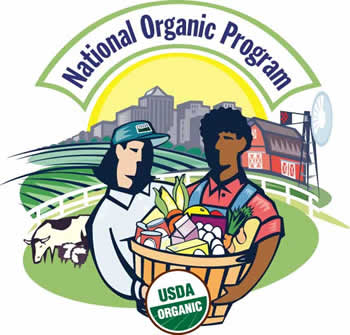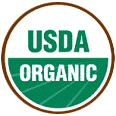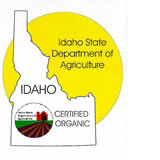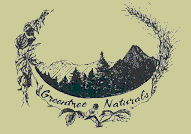About Organic Certification
Organic is more than a labeling term that indicates that the food or other agricultural product has been produced through approved methods. Organic systems work in harmony with nature, keeping harmful chemicals out of our land, water and air, creating a healthy environment rich in wildlife, woodlands and nutrients. These methods integrate cultural, biological, and mechanical practices that foster cycling of resources, promote ecological balance, and conserve biodiversity. The organic standards place great emphasis on building and maintaining healthy soil, nutritious crops and animal welfare. Synthetic fertilizers, sewage sludge, irradiation, and genetic engineering may not be used.
 Greentree Naturals has been certified organic since 1992. Being Certified Organic means that we have a responsibility to our customers to grow the highest quality produce, culinary garlic, and herbs. Benefit from product trust and integrity by buying direct from your farmer. To earn the USDA organic label from the Idaho State Department of Agriculture, our farm has to pass a yearly inspection. Our Organic Certification ensures that our organic produce is grown in accordance to the National Organic USDA specification. We handle everything by hand with tender loving care to assure that the final product does not get bruised or damaged before finding its way to our customers. All amendments added to our soil are 100% organic and approved by the Organic Materials Review Institute. Our farm is far away from conventional farms so there is no chance for over spray. We use organic seed, and have never, ever used pesticides or herbicides. Greentree Naturals has been certified organic since 1992. Being Certified Organic means that we have a responsibility to our customers to grow the highest quality produce, culinary garlic, and herbs. Benefit from product trust and integrity by buying direct from your farmer. To earn the USDA organic label from the Idaho State Department of Agriculture, our farm has to pass a yearly inspection. Our Organic Certification ensures that our organic produce is grown in accordance to the National Organic USDA specification. We handle everything by hand with tender loving care to assure that the final product does not get bruised or damaged before finding its way to our customers. All amendments added to our soil are 100% organic and approved by the Organic Materials Review Institute. Our farm is far away from conventional farms so there is no chance for over spray. We use organic seed, and have never, ever used pesticides or herbicides.
We keep detailed written production records of all planting, weeding, foliage feeding, rotating crops, and natural pest control each year to renew our annual Organic Certification. We have a very personal relationship with the land that we work with our own hands; fresh from our farm to your table. We hope that you will enjoy the bounty of our gardens as much as we enjoyed growing it for you here at Greentree Naturals.
The National Organic Program regulates all organic crops, livestock, and agricultural products certified to the United States Department of Agriculture (USDA) organic standards. Organic certification agencies inspect and verify that organic farmers, ranchers, distributors, processors, and traders are complying with the USDA organic regulations. USDA conducts audits and ensures that the more than 90 organic certification agencies operating around the world are properly certifying organic products. In addition, USDA conducts investigations and conducts enforcement activities to ensure all products labeled as organic meet the USDA organic regulations. In order to sell, label, or represent their products as organic, operations must follow all of the specifications set out by the USDA organic regulations.
 How Do I Know if My Food Is Organic? How Do I Know if My Food Is Organic?
Look at the label. If you see the USDA organic seal, the product is certified organic and has 95 percent or more organic content. For multi-ingredient products such as bread or soup, if the label claims that it is made with specified organic ingredients, you can be confident that those specific ingredients have been certified organic.
Why Certified Organic?
Written for Farmers Market Today Magazine by Diane Green, 2010
The question of whether or not to certify organic often comes up as a topic of discussion amongst farmers at our market. Originally, the claim to being organic was pretty much based on the relationship between the farmer and the consumer. The philosophical views of many of the organic market gardeners that sell at the farmers market are that the integrity of the grower is enough to verify the growing method of the produce being grown and sold as “organic”. Certification was not necessary in the early days of the organic movement when most of us only sold our produce at the farmers market. In the beginning, this may have been alright, but things have changed, rules and regulations have come into play as they often do. The organic certification program is designed to give the consumer assurances regarding the term “organic” when it is used in the marketing and labeling of food products.
I’ve been growing a garden using organic production methods since my very first garden in 1970. When I started selling produce at the farmers market, there were just a handful of market growers making the organic claim. In 1992, before the National Organic Standards were in place, the Idaho State Department of Agriculture stepped up to take over our state organic program and initiated a regulation that we could not refer to our produce as “organic” without going through a registration process and becoming certified organic. Initially, I was furious to have someone dare to challenge my organic claims; how could the state tell me I couldn’t call it organic when it was? My perspective has changed over the years and I now totally support the organic certification program.
Since the National Organic Program has been developed, we have learned about the legalities and the direction of the organic standards act which was basically developed to protect the consumer. “Certified organic” provides a legal guarantee to the consumer that they are actually getting what they pay for. Customers know that anything they purchase that has the certified organic label on it costs more, but if they prefer organic, they are generally willing to pay more; this is a buyer’s choice. Personally, I am willing to pay more for the organic label and many consumers are.
I spend a considerable amount of time educating our customers about the true cost of growing organically by providing brochures that explain what it means to be certified. When you add the additional time involved with becoming certified organic, of course there are additional costs and time investment. For a small acreage farmer, the financial investment for being certified organic can certainly be a challenge, but we continue to endorse the organic program and do what needs to be done to maintain our organic certification.
“Organic Agriculture” is defined as an ecological production management system that promotes and enhances biodiversity, biological cycles, and soil biological activity. It is based on minimal used of off-farm inputs and on management practices that restore, maintain, and enhance ecological harmony. “Organic” is a labeling term that denotes products produced under the authority of the federal Organic Foods Production Act of 1990. The USDA National Organic Program (NOP) and accredited certification agencies regulate organic foods. All products sold as organic in the United States must be certified by a NOP-accredited certification agency.
The thing is, there are people out that that will insist that they are “organic” when they “only use Roundup once a year.” One of my neighbors always referred to his corn as “organically grown” even though the seed was GMO seed, he fertilized with Miracle-Gro, and used Roundup for weed control. He actually believed what he was doing was organic gardening; he wasn’t trying to deceive his customers, he simply didn’t have a clue what organic actually meant. When I asked him about it, he was dead serious about Roundup and Miracle-Gro being organic products because the salesman told him so. I have had numerous conversations with gardeners across the northwest who sell at farmers markets who have told me that they were “mostly organic,” meaning they only used Roundup once a year or only sprayed pesticides once in the growing season, but otherwise they were “organic.” Then there are those who make claims of being “better than organic.” I’m sorry, but all of these alternative claims to certified organic are not serving the needs of the consumer who prefers a chemical-free food source.
We have several customers who have autistic children. I’m not sure how mainstream the treatment is for treating autism with organic food, but we have dedicated customers who insist that feeding only organic food to their children is a positive treatment for this syndrome. They have told me that they notice a considerable change when the children eat non-organic food. We have elderly clientele who are absolutely convinced that their longevity and good health is a direct association with the food that they purchase from us. Naturopaths and medical doctors are suggesting organic food for all kinds of reasons. When I teach workshops about local food systems, I always say “if you aren’t growing your own, the next best thing is to have a relationship with someone that is growing organically.” And whether or not it is certified organic or simply grown using the basic principles of organic production, this all depends on the relationship that you have with your customer.
If you are only selling at the farmers market, chances are you have regular weekly buyers who know you. There are shoppers who come to the farmers market that will only purchase from certified organic farms; others don’t really care what kind of growing techniques were used and will purchase from any vendor. I think that most of the long time vendors at our farmers market have a well established customer base regardless of their production techniques. Making the decision to become certified organic truly relates to who your customer is. If you have customers asking about your growing practices, then it makes a difference to them. You may want to consider doing some sort of market survey of your customers to find out if it makes a difference to them whether or not you are growing organically, certified or not. Truly, the only reason to go through the certification process is directly related to who your customer is. We started out selling at the farmers market and now sell to a variety of places that all prefer that we have the organic certification to back our claims.
Out of sixty farms selling at our farmers market, there are only three of us that have continued to go through the annual re-certification process to be able to call ourselves “certified organic.” When we first certified in 1992, there were twelve farms. These numbers have dwindled for a number of reasons; some are no longer farming, others no longer feel a need to spend the time and money to certify because they have the trust of their customers. There are quite a few growers who have signs up that state their growing practices as “natural and chemical free” others do not have any kind of signage explaining their growing practices. As a market place, our farmers market does not encourage or discourage any particular growing method. This is certainly an individual choice and the vendors at the market know that this certification program is an option; the information is available to anyone that is interested. It is up to the market manager to assure that the vendors that advertise their produce as “certified organic” is indeed what it says it is.
I wanted to include some basic information about the organic certification process for you to consider. The term “organic” is only to be used by certified organic producers. There is an exemption for growers selling under $5,000 a year, who must still comply and submit to a records audit if requested, but do not have to formally apply. In the State of Idaho, if gross sales or organic products are $5,000 or less, you must still register with the Idaho State Department of Agriculture Organic Program in order to use the term “organic.” A good record keeping system is absolutely necessary if you are making a claim that your produce is organic.
Basically program registrants submit an application, appropriate fees and a producer/handler organic plan with farm maps to the certifying agency. Accurate recordkeeping is required. An inspector will visit each farm or handling operation during the growing season and samples may be taken for pesticide residue analysis. Depending on the type of operation, the inspection my include a field visit, soil/foliage sampling, review of equipment, storage and processing sites, as well as review of records detailing inputs, growing practices and/or handling processing practices.
It is helpful to take the time to study the organic standards, which cover in specific detail what is and is not allowed for every aspect of farming, including storage, transport and sale. We use the Organic Materials Review Institute (OMRI) as a resource for determining what products are approved for our organic certification and check it often. OMRI is a national nonprofit organization that determines which input products are allowed for use in organic production and processing. OMRI listed or approved products may be used on operations that are certified organic under the USDA National Organic Program. Some typical examples of the types of OMRI reviews are fertilizers for organic farming and feed supplements for organic animal production. We frequent the OMRI website for checking compliance of different items (visit www.omri.org).
There is a considerable amount of paperwork involved, which I believe is one of the main reasons people often opt out of the organic program. Extensive paperwork is required, detailing farm history and current set-up along with results of soil and water tests. Once you have taken the time to detail your farm history and write down the basic back-story of your farm, you have this as a template to modify as your operation grows.
Record-keeping is crucial. For certification, written day-to-day farming and marketing records covering all activities must be available for inspection at any time. We maintain a written daily diary during the growing season which covers all farm activities and inputs. I simply set up a daily file on our computer where we write down everything that we are doing in the garden. I believe we would maintain a daily diary for our farm whether or not we were certifying or not. Having up-to-date daily records has been helpful for reviewing year-to-year activities and helps us manage our time better overall. We submit our daily farm diary at the time of inspection along with our marketing records.
I know that bookkeeping is generally one of the least favorite things most farmers want to do, but truly, if you aren’t keeping track, you really don’t have a way of monitoring successes of your farm as a business. Our harvest records are an important part of our management system. I keep a simple hand written spread sheet that lists everything that we grow; as we harvest, we weigh it and write it down. At the end of the season, we total the amounts of the harvest and know exactly how much of a particular crop came out of a 90 foot row as well as when the first and last harvest occurred.
We have an annual on-farm inspection every year that is typically scheduled soon after all of the crops have been planted. The inspector comes out for a tour of the farm, examines our records and interviews us about the written materials we have submitted with our application. A part of our organic inspection is to follow a crop all the way through the growing season, from seed to harvest and compare yields to sales. While this all takes more time, we would do this kind of record keeping regardless of being monitored by the organic certification program. How else are you going to determine the success or failure of any particular crop?
There is a significant amount of paperwork required detailing farm history. The organic certification requires a written annual production plan detailing seed sources, field and crop locations, fertilization and pest control activities, harvest methods and storage locations. Documentation is essential for managing a successful small farm enterprise whether you are certified organic or not. Making the decision to certify truly depends on who you plan on selling your crop to.
| 











 Greentree Naturals has been certified organic since 1992. Being Certified Organic means that we have a responsibility to our customers to grow the highest quality produce, culinary garlic, and herbs. Benefit from product trust and integrity by buying direct from your farmer. To earn the USDA organic label from the Idaho State Department of Agriculture, our farm has to pass a yearly inspection. Our Organic Certification ensures that our organic produce is grown in accordance to the National Organic USDA specification. We handle everything by hand with tender loving care to assure that the final product does not get bruised or damaged before finding its way to our customers. All amendments added to our soil are 100% organic and approved by the Organic Materials Review Institute. Our farm is far away from conventional farms so there is no chance for over spray. We use organic seed, and have never, ever used pesticides or herbicides.
Greentree Naturals has been certified organic since 1992. Being Certified Organic means that we have a responsibility to our customers to grow the highest quality produce, culinary garlic, and herbs. Benefit from product trust and integrity by buying direct from your farmer. To earn the USDA organic label from the Idaho State Department of Agriculture, our farm has to pass a yearly inspection. Our Organic Certification ensures that our organic produce is grown in accordance to the National Organic USDA specification. We handle everything by hand with tender loving care to assure that the final product does not get bruised or damaged before finding its way to our customers. All amendments added to our soil are 100% organic and approved by the Organic Materials Review Institute. Our farm is far away from conventional farms so there is no chance for over spray. We use organic seed, and have never, ever used pesticides or herbicides. How Do I Know if My Food Is Organic?
How Do I Know if My Food Is Organic?